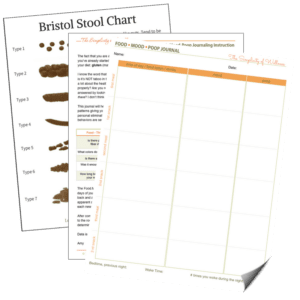Diet Journal
Do you track what you eat? Does the idea of keeping a food journal make life seem a little less fun? Do you have certain weight loss or health goals that continue to beyond your reach?
The idea of keeping a food log tends to put people in one of two camps, yes it’s awesome and no that’s a crazy disordered eating thing. I have to say, I’m not a regular food tracker. I do track but I do it in waves. Typically I track when I’m trying to discover some nugget of information.
So, in my mind, there are some good reasons to track what you eat and there are particular people who could benefit with a bit of food tracking. There are also people who shouldn’t track their food.
Reasons To Keep A Food Journal
First, let’s talk about the people who could benefit from keeping a daily food journal. Typically a person trying to achieve a goal or figure something else out about their body.
- Someone looking for personal data or information. This tends to be me. I like to do what is called N=1 experiments. As a nutritionist those experiments tend to revolve around food and how my body reacts to food.
- Someone with weight loss, or more accurately, fat loss goals. This is similar to above. This person is watching data and looking for trends. Which foods, calories, nutrients move her closer to her goal and which do not. This is valuable data that can make weight loss goals a reality.
- Someone who has specific principles about how they eat: Low Carb, Ketogenic, Paleo, Autoimmune Paleo, Gluten Free, Sugar Free, Vegetarian etc…
- Someone with gut issues or other dysfunction. This could be a person who suspects that they have food sensitivities that may be affecting their over all health. This is similar to #1, personal data collection or learning about how your body works.
Now, let’s talk about those who probably shouldn’t keep a food diary.
- Someone with a history of disordered eating. Keeping a food journal could easily restart a messed up relationship with food. Too much focus on food. If this is you, skip the journal and just enjoy your food. Eat real, whole, non-processed food and don’t worry about the minor details
- Someone with an obsessive personality. This actually points back to #1 a little bit too. Basically if you have a perfectionist, obsessive streak food journaling might cause you too be too restrictive about food and that really can take some of the fun out of life. Know thy self, if this is you I would be careful with tracking your food.
- If you’re enjoying a vacation. Vacation is a time to relax and enjoy your friends and loved ones.
Food Journal Benefits
If you’re still with me, and since this post is about tracking food or food journaling let’s talk about why I think it can be an excellent data collection tool. Actually, if done correctly, a food journal is one of the best ways to collect personal data about how your unique body functions.
So what do I mean by ‘done correctly’? I don’t think just tracking food calories, or even macro nutrients like fats, carbs and proteins is that useful. I prefer a Food-Mood-Poop tracker. This will give you TONS more information about how your body functions and how different foods affect that function.
If you’re using an electronic food diary app or online food tracker and it doesn’t have an area for you to make note of how you feel, how you slept, what happened during your day and when you pooped (or didn’t poop) then I personally think it’s mostly a waste of time.
Food-Mood-Poop Journal
As I’ve said many times before and will continue to say, food is information. What you choose to eat sends very specific messages to your body about how to function. If you want to understand why your body reacts in a certain way you need to pay attention to what you told it to do. Let me give you two examples of how this could be helpful:
Example #1: Weight Loss Goal
You’re eating what most would consider clean, healthy food but you aren’t getting any closer to your weight loss and/or health goals.
Is the food you’re eating is telling your body to store body fat or burn body fat? Well, looking more closely at the breakdown of your fats, carbs and proteins could give you the information you need to understand why your body isn’t budging. BUT, the other things you want to pay attention to are, the quality of your sleep, if certain foods set you off and cause a binge. Are there blood sugar issues you’re unaware of? Could certain foods keep your inner craving monster alive? All stuff that needs to be document as “mood”.
If you’re interested in understand more about what the fats, carbs and proteins in your diet are telling your body when it comes to storing or burning body fat, download my Free guide – 3 Key Tips on How To Lose Belly Fat. This guide will help explain what you want to look for when tracking fats, carbs and protein and why even if you’re eating healthy you could still be storing fat not burning fat.
I’ll talk more about the breakdown of fats, carbs and proteins in my next post about my favorite on-line Food Tracking Apps. But for now, let’s move on to example two.
Example #2: IBS-D
Unfortunately, you are one of the many that suffers with IBS-D, that would be IBS that presents as diarrhea. This can be totally debilitating. You could live in fear of leaving your house. That is no way to live. Wouldn’t you love to know WHY you sometime can’t leave your house and then other times you seem almost o.k.? You need data. You need to pay attention to what messages you are sending your body.
A food-mood-poop journal gives you extra, important information. Here’s how it works:
- Write down the time you start eating a meal, breakfast for example. Write down all the food/drinks you ate. Don’t worry about quantity, just what it is you ate. You can certainly include quantity if that’s easy for you.
- In the mood column, write down everything you feel from the start of that meal until your next round of food. The next round could be a snack or a meal, it’s the moment you put more food in your mouth. You will again, jot down the time and what you ate.
- Example of things you might note in the mood column: your stomach started hurting, you felt exhausted after you finished your meal, you felt exhausted an hour after eating, you felt energized after your meal, you noticed you were in a great mood, you got a headache, you suffered with some brain fog, you notice your feet started to ache, you felt stiff and your joints ached, the list goes on but I hope you get the idea. Note anything and everything about how you feel both in body and mind.
- The third thing you’re going to track is your elimination pattern, or put more simply when and how you poop.This is the really valuable stuff. Do you poop everyday? Do you poop more than once a day? Is there a specific food that you always poop after eating? Is there a food that you notice causes constipation?
- You’ll not only track when you poop but also what what kind of poop you had. You can use the Bristol Stool Chart to evaluate your poop type. Obviously, you want a perfect poop. The chart makes it clear what your ‘perfect’ poop should look like.
Can you see how this will give you very valuable information? This stuff is gold! Once you know what’s working for you and what’s NOT you can actually make adjustments to your diet and start to take control of your health.
 Download My Fillable Food-Mood-Poop Journal
Download My Fillable Food-Mood-Poop Journal
Are you intrigued? Does the idea of tracking your personal information seem more interesting?
If you’d like to give the Food-Mood-Poop journal a try you can go ahead and use any notebook you have hanging around the house or you can download my fillable Food-Mood-Poop Journal form. You’ll also get a page with directions and a Bristol Stool Chart for poop referencing.
My next post will be about my 3 favorite on-line Food Trackers.
Be well,
Amy

I’m Amy a board certified holistic nutritionist, certified functional nutritionist and lifestyle practitioner and certified Life Coach. I help women in midlife understand the changing needs of their body so that they can stop dieting and lose weight permanently. At 56 I live what I teach. Don’t believe the story that your best years are behind you. They are not. Your best years are just starting!

 Download My Fillable Food-Mood-Poop Journal
Download My Fillable Food-Mood-Poop Journal